De Duitse dichteres en schrijfster Katharina Hacker werd geboren op 11 januari 1967 in Frankfurt am Main. Zie ook alle tags voor Katharina Hacker op dit blog.
Uit: Eine Dorfgeschichte
„Ein Toter oder Apfeldieb oder auch ein Soldat aus dem hinteren Wald, der abschüssig in Richtung Tal ging und im Frühling voller Buschwindröschen war. Unter den Buschwindröschen oder zwischen Zweigen, Blättern, Steinen konnte man Helme und Patronenhülsen aus dem Krieg finden, weil in dem Waldstück Soldaten gekämpft hatten, gegen die anrückenden Amerikaner, die dann doch ersehnt waren, weil es im Dorf Flüchtige gab, Fahnenflüchtige, Deserteure, später dann andere Flüchtlinge, woher die kamen, aus dem Osten und wie, auf Wagen oder mit der Eisenbahn bis Michelstadt, bis Amorbach, den Berg zu Fuß hinauf, vor den letzten Bomben fliehend oder eben vor den Befreiern, Besatzern, das Parteibuch zerrissen, die Abzeichen versteckt. Juden hatte es im Dorf nicht gegeben, sie hatten wohlweislich nicht versucht, dorthin zu flüchten, es hätte ihnen kaum geholfen.
Die Synagoge in Michelstadt wurde verwüstet, vielleicht war sie zu nahe an den anderen Häusern, als dass man sie hätte abbrennen mögen, für die Menschen hat das nichts geändert. Wir haben uns vorgestellt als Kinder, wo Verstecke hätten sein können, wir zeigten sie meiner Großmutter, wir zeigten sie meinem Großvater, schauten neugierig, wie sie schwieg, wie er schwieg, und dann richteten wir uns gerade auf, denn wir, das wussten wir mit Sicherheit, hätten nicht zugelassen, dass auch nur einem Juden ein Haar gekrümmt wird.
Meine Großmutter spielte nicht mit, wenn wir Flüchtlingszug aus dem Osten spielten, gab uns kein Brot und keine Wasserflasche. Wir borgten von den Nachbarsbauern Säcke für den großen Leiterwagen und füllten sie mit Heu und Stroh, wir zogen einer den anderen die Feldwege entlang, stöhnend und klagend, verbanden die Verletzten, luden Tote ab, ließen sie liegen.
Frederik war der beste Tote, den wir hatten. Er blieb liegen, bis abends, bis zum Essen, bis meine Mutter rief, mein Vater suchte, fand ihn am Waldrand, starr geworden vom langen Tod. Mit Frederik wagte ich mich auch wieder in jenen Keller, er war ein Angsthase, aber furchtlos dabei, er plapperte ausgiebig von seiner Angst, ging in den Höllenschlund, in jedes dunkle Loch, lief mutterseelenallein – laut rufend, wie er sich fürchte – in das Verlies der Wildenburg, die wir mit jedem neuen Gast besuchen mussten, verschwand, und wieder musste mein Vater ihn finden. Denn wenn wir Krieg spielten, waren meinem Großvater die Hände gebunden, und meine Großmutter konnte uns nicht retten.“
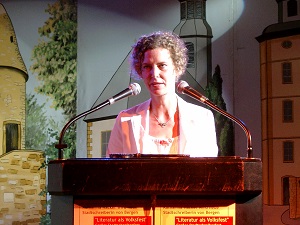
Katharina Hacker (Frankfurt am Main, 11 januari 1967)
De Britse schrijver en cameraman Jasper Fforde werd geboren op 11 januari 1961 in Londen. Zie ook alle tags voor Jasper Fforde op dit blog.
Uit: Early Riser
“We drove across the city at daybreak, the tracks of the Sno-Trac clean and sharp over a fresh fall of snow, the sky slate-grey. Only the thin trails of vapour rising from the numerous Dormitoria gave any clue that we were in a city of almost half a million people. Despite it being two days before Winter officially began, most people had already hunkered down, and anyone who wasn’t yet asleep would be going through their pre-hibernatory nesting rituals. Yoga and Gregorian chants were always popular, with yoyo, tango, humming, bezique and watercolouring going in and out of favour as the vagaries of fashion saw fit. But for most people it was a simple slowing of activity, purposefully avoiding anything exciting. This was a winding down, a relaxing of mind and spirit. To assist initial descent and a free return in case of an accidental awakening, the networks ran looped repeats of Bonanza throughout the Winter. Residents with Random Waking Syndrome kept a TV switched on at the foot of their bed, sound turned down low, the picture dimmed.
`It’s only dull by endless repetition,’ Logan had explained earlier, while we discussed strategies to ease anomalous wakers back to sleep, ‘and the close familiarity of the characters and situations make for an often transcendental drifting of the mind.’ No one quite knew why Bonanza had become the TV series of choice for the Winter, but the more it was watched, the more suited to easement it became. If the machinations of the Cartwright family didn’t work, you could always watch reruns of Crossroads or resort to the default entry-level route to welcome catatonia: Ulysses, Moby Dick or War and Peace. I halted the Sno-Trac outside the Beryl Cook Dormitorium, the largest of twenty-seven Kipshopsn on the seafront at Penarth. I made sure the compressed air tank was in the green so I could effect a restart, then stopped the engine and climbed out of the rear door.”
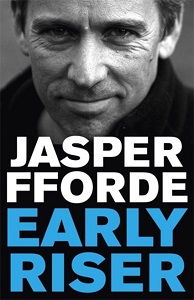
Jasper Fforde (Londen, 11 januari 1961)
Cover
De Amerikaanse schrijver, sportjournalist en oorlogscorrespondent W. C. Heinz werd geboren op 11 januari 1915 in Mount Vernon, New York. Zie ook alle tags voor W. C. Heinz op dit blog.
Uit:The Professional
“I shall remember it as long as I live. I was young then, and I had been on the paper about I three years. They had me teething on boxing, and I had hit it off with Doc. Doc had a good-looking heavyweight at the time, a big blond, out of Des Moines and named Al Fraley. Fraley’s old man had been a Methodist minister, and that made a natural for Doc. The big kid was devout enough, but Doc made him wear dark suits and black ties and carry a Bible into the dressing room, and he called him Deacon Fraley. It was an era when you sold a fighter to the public in every way that you could. This was right after Tunney retired with the title, and there was that confusion in the heavyweight ranks. There were three or four of the battleships with a chance, but the best of them all was the Deacon—or, rather, the Deacon and Doc. When a kid starts out to become a fighter and, somewhere, walks into a gym, bag in hand, he is like a rough-cut block of marble emerged from the quarry that is the mass of man. In any block a stone mason can see many things, but a master sculptor can see but one. In his eye no two blocks of marble are alike, and the thing he sees is the thing for which the block was created and that is the way Winged Victory comes about. That is the way it has always been, too, with Doc. In the boxing business, as in any business, there are hundreds of masons and three or four master sculptors, and the best was Doc. I watched him for years, with a dozen fighters, working carefully with reason and inspiration, shaping slowly and stepping back and looking at what he had done, hiding his excitement and his fear, too, behind that cynical front. Until Eddie Brown came along, Deacon Fraley, even more than Rusty Ryan, was the one. The greatest sculptor in the world, working in marble, cannot add a thing. If it is not there, it is not there. No man makes it, and so no man is truly creative, but by subtraction from the whole he reveals it. That is the nearest that man can come to creation, and that is why the great are afraid. Only they can see all of it, and they are afraid that, in their process of subtraction, they will not reveal the all of it, and what is hidden will remain hidden forever. They are even more afraid that, in the process, they will cut too far and destroy that much of it forever. It is that way in the making of all things, including the making of a fighter. At that time, Doc had the Deacon living in a boardinghouse on West Ninety-second Street, and Doc and I happened to be living in the same hotel. It was on West Forty-eighth Street, but it is not there any more, which is just as well. It was not much of a hotel. It was in the fall of the year. At about 10:30 that night the phone in my room rang and it was Doc. He asked me to come down to his room, and when I got there the door was open and I walked in. He came out of the bathroom, pressing a strip of adhesive over a strip of gauze on his right hand. “What happened to you?” I said. “I’ve just had a visit from the Almighty,” he said.”
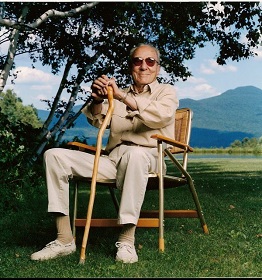
W. C. Heinz (11 januari 1915 – 27 februari 2008)
De Griekse dichter, schrijver en zeeman Nikos Kavvadias werd geboren op 11 januari 1910 in Nikolski Ousouriski. Zie ook alle tags voor Nikos Kavvadias op dit blog.
Black And White
Wann sieht man den Leuchtturm von Aalborg?
Das Konservatorium entliess die Schülerinnen.
Leuchtreklamen in der Odos Stadiou.
Die Brücke nass und finster.
Erschrecktes Auge, vergeblich halte ich an dir fest
Zur Zeit, wo gerade der Scirocco weht.
Arbeite mit der Schaufel, Schwarzer aus Marokko,
Der Kräuter kaut gegen das Fieber.
Femina! Tanz der Köpfe.
Die Nan-ko tanzen in Asien.
Du leidest – sagtest du mir – an der Feuchtigkeit
Und an deiner alten Krankheit von Toulon.
Ginger, die du mich durch die Brille anschaust,
Den Leuchtturm von Aalborg sieht man nicht.
Ich, ich sehe in London Fanny,
Die einen anderen küsst.
Gesalzenes Fleisch aus der Box.
Myopischer, alter Kapitän,
Ich kenne ein Zauberpulver,
Perfekt für die Pupille des Auges.
Mach Licht auf der Brücke.
In mir spricht ein Papagei,
Alt, krummschnäblig und gross
Aber voller Erfahrung und klug.
In mir tiefer Atem.
Die Matrosen des Kolumbus sind aufgewacht.
Verbrenne jetzt alle Raketen
Und schicke Marconi das SOS.
Vertaald door Heinz Schmitz
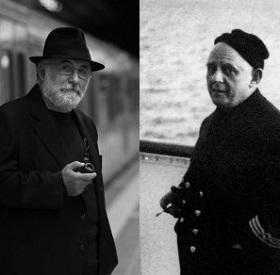
Nikos Kavvadias (11 januari 1910 – 10 februari 1975)
Hier met de componist Thanos Mikroutsikos (links)
De Nederlandse (sport)journalist, schrijver en radio- en televisiepresentator Martinus Jan (Mart) Smeets werd geboren in Arnhem op 11 januari 1947. Zie ook alle tags voor Mart Smeets op dit blog.
Uit: Verhaal halen
“Het schrijverschap van Mart Smeets is geboren uit liefde.
‘Dat begon op de middelbare school, de Tweede O.H.S. in Amsterdam. Door twee leraren Nederlands. De een was een gesjeesde romancier, Pieter Kuyk. De ander, Jaap Hoogteijling, rookte pijp. Ook voor de klas. Zij hebben mij de liefde voor het woord meegegeven. Zij wakkerden mijn belangstelling aan voor de Tachtigers, voor Hubert Lampo en voor vele andere Vlaamse schrijvers.’
Hij denkt dat er een dichter in hem schuilt, wanneer hij een eervolle vermelding krijgt bij de famos-gedichtenwedstrijd. Het pragmatisme wint. ‘Ik las vreselijk veel. Ik was vooral geïnteresseerd in hoe ik met het woord mensen kon bereiken. Dichten was me te vaag… heel moeilijk ook om dat goed te doen.’
Mart Smeets schrijft vanaf zijn zestiende. ‘Min of meer gestileerde verhalen’ noemt hij het.
Vanzelfsprekend maakt hij de clubkrant van de Amsterdamse basketbalvereniging DED, waar hij in de jaren zestig speelt. ‘De stencilmachine stond bij ons thuis.’ Iets serieuzer wordt het in 1966 en 1967. De stukken worden langer, met telkens de basketbalsport als onderwerp.
Op maandag koopt hij de Belgische krant Het Laatste Nieuws met iedere maandag van de hand van Bob Geuens een hele pagina over basketbal. ‘Ik spelde die krant en niet vanwege de wielerverhalen.’
Mart Smeets trekt de stoute schoenen aan, schrijft een stuk ‘over de stand van zaken in het Nederlands basketbal’ en stuurt het naar Geuens. Het Laatste Nieuws plaatst zijn bijdrage. ‘Ik kreeg er, per internationale postwissel, 25 gulden voor!’
ded is inmiddels Flamingo’s geworden, de Haarlemse hemelbestormer in het Nederlandse basketbal. Het is 1968. Smeets: ‘Mijn leven toen? Beetje basketballen, beetje schrijven.’
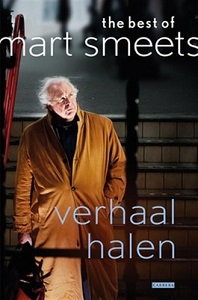
Mart Smeets (Arnhem, 11 januari 1947)
Cover
De Braziliaanse schrijver Oswald de Andrade werd geboren op 11 januari 1890 in São Paulo. Zie ook alle tags voor Oswald de Andrade op dit blog.
Portuguese error
When the Portuguese arrived
In pouring rain
They clothed the Indian
What a shame!
Had it been a sunny morning
The Indian would have stripped
The Portuguese.
The discovery
We followed our course on that long sea
Until the eighth day of Easter
Sailing alongside birds
We sighted land
the savages
We showed them a chicken
Almost frightening them
They didn’t want to touch it
Then they took it, stupefied
it was fun
After a dance
Diogo Dias
Did a somersault
the young whores
Three or four girls really fit very nice
With long jet-black hair
And shameless tits so high so shapely
We all had a good look at them
We were not in the least ashamed.
3rd of May
I learned from my ten-year old son
That poetry is the discovery
Of things I’ve never seen.
Vertaald door Natalie d’Arbeloff
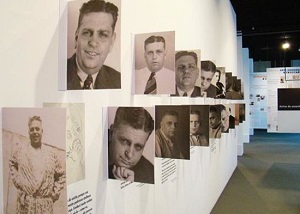
Oswald de Andrade (11 januari 1890 – 22 oktober 1954)
Expositie over de dichter in het Museu da Língua Portuguesa, São Paulo
De Spaanse schrijver Eduardo Mendoza werd geboren in Barcelona op 11 januari 1943. Zie ook alle tags voor Eduardo de Mendoza op dit blog.
Uit: Das Missverständnis (Vertaald door Benjamin Loy)
„Antolín Cabrales Pellejero, alias Poca Chicha, wurde in das hineingeboren, was man später eine dysfunktionale Familie zu nennen pflegte, türmte aus einigen Schulen und flog von verschiedenen anderen, weshalb er, als er mit 21 Jahren ins Gefängnis kam, zwar lesen und schreiben konnte, sonst aber auch weiter nichts. Nicht dass er die Kultur verachtete: Er hatte in ihr einfach nie ein Interesse oder einen Nutzen gesehen. Einmal im Gefängnis, hielt ihn diese Haltung jedoch nicht davon ab, von der Möglichkeit einer Strafreduzierung Gebrauch zu machen, indem er an Kursen teilnahm, die einige selbstlose Lehrer regelmäßig mit den Gefangenen durchführten. Angesichts dieser verlockenden Perspektive schrieb sich Antolín Cabrales gleich für mehrere Kurse ein, darunter einer über literarisches Schreiben und Interpretation und zugleich der einzige, in dem er mehr als zwei Tage durchhielt.
Die für den Literaturkurs verantwortliche Dozentin hieß Inés Fornillos und war eine 34 Jahre alte, winzige und leicht untersetzte Frau mit rundlichem Gesicht und kurzsichtigen Augen. Sie hatte Philosophie und Literatur studiert, einen Handelsvertreter geheiratet und eine Arbeit als Lehrerin für Latein, Griechisch sowie spanische Literatur und Literatur im Allgemeinen an einer Privatschule gefunden, die jedoch nach einigen Jahren aus wirtschaftlichen Gründen schließen musste und sie vor die Tür setzte. Damals begannen Frauen in Massen an die Universitäten zu strömen, und die Mehrheit entschied sich für ein Studium der Philosophie und Literatur, wo die Konkurrenz der Männer geringer war. Da der übliche Weg dieses Studiums in den Lehrerberuf führte, war der Markt bald übersättigt und so fand die Señorita Fornillos lediglich kurze Schwangerschaftsvertretungen und einige schlecht bezahlte Nachhilfestunden während der Sommermonate. Unzufrieden mit diesem Zustand der Unsicherheit wurde sie auf eine Stellenanzeige für Literaturkurse für Häftlinge aufmerksam und bewarb sich darauf. Ihr Mann war dagegen, aber sie hatten zwei kleine Kinder und es war nicht einfach, mit den Verkaufskommissionen über die Runden zu kommen. Sie erkundigten sich und man versicherte ihnen, dass die Arbeit im Gefängnis keinerlei Risiko mit sich brachte.“
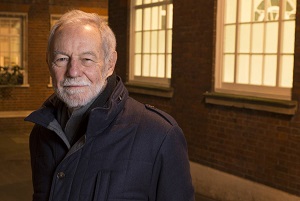
Eduardo Mendoza (Barcelona, 11 januari 1943)
De Amerikaanse schrijfster Diana Gabaldon werd op 11 januari 1952 geboren in Williams, Arizona. Zie ook alle tags voor Diana Gabaldon op dit blog.
Uit: Go Tell The Bees That I Am Gone (Outlander 9)
“I was startled from a solid sleep by Jamie exploding out of bed beside me. This wasn’t an uncommon occurrence, but as usual, it left me sitting bolt upright amid the quilts, dry-mouthed and completely dazed, heart hammering like a drill-press.
He was already down the stairs; I heard the thump of his bare feet on the last few treads—and above that sound, frenzied pounding on the front door. A ripple of unrest spread through the house: rustling bedclothes, sleepy voices, opening doors.
I shook my head violently and flung off the covers. Him or me? was the first coherent thought that formed out of the fog drifting through my brain. Night alarms like this might be news of violence or misadventure, and sometimes of a nature that required all hands, like a house fire or someone having unexpectedly met with a hunting panther at a spring. More often, though…
I heard Jamie’s voice, and the panic left me. It was low, questioning, with a cadence that meant he was soothing someone. Someone else was talking, in high-pitched agitation, but it wasn’t the sound of disaster.
Me, then. Childbirth or accident? My mind had suddenly resurfaced and was working clearly, even while my body fumbled to and fro, trying to recall what I had done with my grubby stockings. Probably birth, in the middle of the night… But the uneasy thought of fire still lurked on the edge of my thoughts.
I had a clear picture in my mind of my emergency kit, and was grateful that I’d thought to refurbish it just before supper. It was sitting ready on the corner of my surgery table. My mind was less clear about other things; I’d put my stays on backward. I yanked them off, flung them on the bed, and went to splash water on my face, thinking a lot of things I couldn’t say out loud, as I could hear children’s feet now pattering across the landing.
I reached the bottom of the stairs belatedly, to find Fanny and Germaine with Jamie, who was talking with a very young girl no more than Fanny’s age, standing barefoot, distraught, and wearing nothing more than a threadbare shift. I didn’t recognize her.”

Diana Gabaldon (Williams,11 januari 1952)
Scene uit de tv-serie “Outlander” met Caitroina Balfe (Clair) en Sam Heughan (Jamie)
De Macedonische dichter en schrijver Slavko Janevski werd geboren op 11 januari 1920 in Skopje. Zie ook alle tags voor Slavko Janevski op dit blog.
Silence
When the poppies pull themselves up from their roots
and start out
one after the other
toward the sunset,
do not follow them.
There are no weddings anymore
and each step stands autumn
ridiculous, white and bare.
When the poppies leave behind them devastation,
shut up the rain inside you.
Let it ring in the gutter of your veins
beneath a familiar ceiling.
And be quiet.
When the wind falls upon your window
with three thin cries
and the weeping of a half-grown crane,
again be quiet.
The poppies hate speaking.
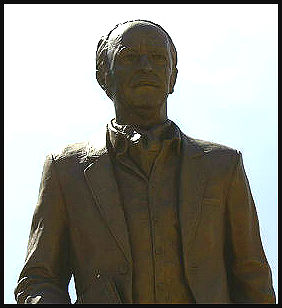
Slavko Janevski (11 januari 1920 – 20 januari 2000)
Monument in Skopje
Zie voor nog meer schrijvers van de 11e januari ook mijn blog van 11 januari 2017 en ook mijn blog van 11 januari 2015 en ook mijn blog van 11 januari 2016 deel 2.

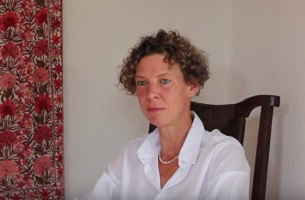
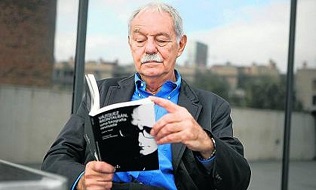
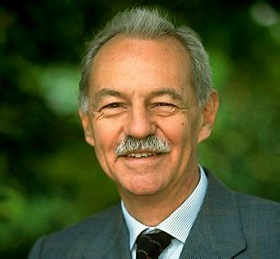
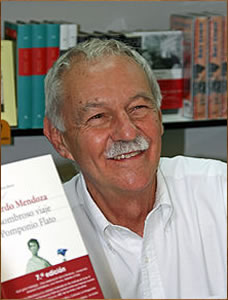









![nikos_kavvadias[1] nikos_kavvadias[1]](https://romenu553547602.files.wordpress.com/2009/01/acba6-dyn006_original_183_300_pjpeg_2535747_681ed1410d546c1d0d1ef2d21630d3c1.jpg)







